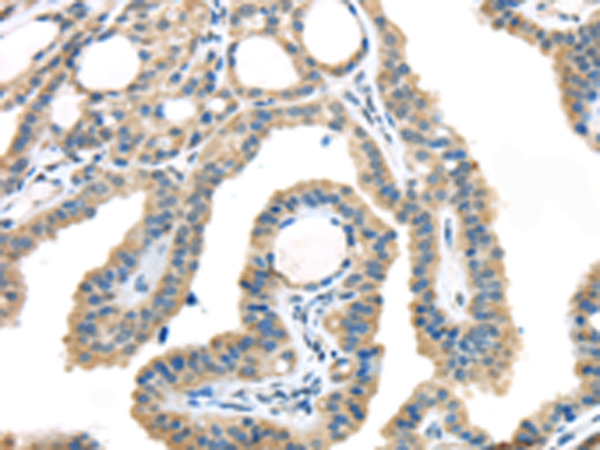


| WB | 咨询技术 | Human,Mouse,Rat |
| IF | 咨询技术 | Human,Mouse,Rat |
| IHC | 1/30-1/150 | Human,Mouse,Rat |
| ICC | 技术咨询 | Human,Mouse,Rat |
| FCM | 咨询技术 | Human,Mouse,Rat |
| Elisa | 1/1000-1/2000 | Human,Mouse,Rat |
| WB Predicted band size | 67 kDa |
| Host/Isotype | Rabbit IgG |
| Antibody Type | Primary antibody |
| Storage | Store at 4°C short term. Aliquot and store at -20°C long term. Avoid freeze/thaw cycles. |
| Species Reactivity | Human, Mouse, Rat |
| Immunogen | Synthetic peptide of human VGF |
| Formulation | Purified antibody in PBS with 0.05% sodium azide and 50% glycerol. |
+ +
以下是3篇与VGF抗体相关的代表性文献摘要:
---
1. **文献名称**:*VGF is required for obesity induced by diet, gold thioglucose treatment, and agouti and is differentially regulated in pro-opiomelanocortin- and neuropeptide Y-containing arcuate neurons in response to fasting*
**作者**:Hahm S, et al.
**摘要**:该研究利用VGF基因敲除小鼠模型,结合VGF特异性抗体检测,发现VGF在中枢能量平衡调节中起关键作用。抗体免疫组化显示VGF在下丘脑POMC神经元中高表达,且其表达水平受摄食状态调控。
---
2. **文献名称**:*TLQP-21. a VGF-derived peptide, enhances energy expenditure and reverses diet-induced obesity through peripheral β-adrenergic receptor signaling*
**作者**:Bartolomucci A, et al.
**摘要**:研究聚焦于VGF衍生肽TLQP-21的代谢调控功能。通过VGF抗体的免疫中和实验,证实TLQP-21通过激活β-肾上腺素能受体促进脂肪分解和产热,为肥胖治疗提供了新靶点。
---
3. **文献名称**:*Antibody-based detection of VGF peptides in endocrine cells and neuronal projections*
**作者**:Possenti R, et al.
**摘要**:开发了特异性识别VGF羧基端肽段的单克隆抗体,验证了其在脑组织和外周内分泌细胞中的定位效能。抗体成功应用于免疫印迹和免疫荧光,揭示了VGF在神经内分泌信号中的广泛分布。
---
这些研究均通过VGF抗体的实验手段,揭示了该神经肽在代谢调控、能量平衡及神经信号传导中的关键作用。如需具体文献链接,建议在PubMed或Web of Science平台通过标题检索。
VGF (non-acronymic) is a neurosecretory protein initially identified as a nerve growth factor-responsive transcript in sensory neurons. It encodes a precursor protein that undergoes proteolytic cleavage to generate multiple bioactive peptides, including TLQP-62. NERP-1/2. and AQEE-30. implicated in energy homeostasis, pain modulation, and neuroendocrine regulation. VGF-derived peptides are widely expressed in the central and peripheral nervous systems, endocrine cells, and metabolic tissues.
VGF antibodies are essential tools for detecting VGF protein or its processed peptides in research. They enable the investigation of VGF's roles in neuroplasticity, stress response, and metabolic disorders. These antibodies are commonly used in techniques like Western blotting, immunohistochemistry, and ELISA to map VGF expression patterns in brain regions (e.g., hypothalamus, hippocampus) and peripheral tissues.
Studies utilizing VGF antibodies have linked altered VGF levels to depression, schizophrenia, Alzheimer’s disease, and metabolic syndromes. For example, reduced hippocampal VGF correlates with cognitive deficits, while its overexpression in adipose tissue influences insulin sensitivity. Commercially available VGF antibodies often target specific epitopes (e.g., C-terminal regions), but validation via knockout controls is critical due to potential cross-reactivity with structurally similar peptides. Emerging applications include exploring VGF as a biomarker or therapeutic target for neuropsychiatric and metabolic diseases.
×